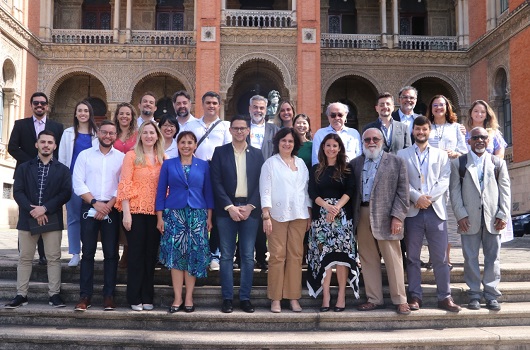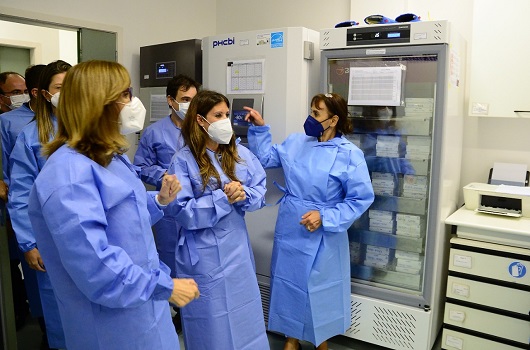Fiocruz receives the WHO's technical lead on COVID-19 and delegations from PAHO and Ministry of Health
13/05/2022
Ana Paula Blower and Ciro Oiticica (Fiocruz News Agency)
During a visit to Fiocruz last Friday (6 May), the World Health Organization's (WHO) technical lead for COVID-19 response, Maria Van Kerkhove, debated the learnings and challenges necessary to maintain investments that were focused on the pandemic's preparedness for possible new public health emergencies. After getting to know more about the Foundation’s actions and visiting the Laboratory for Measles and Respiratory Viruses of the Oswaldo Cruz Institute (IOC/Fiocruz), the Hospital Center of the Evandro Chagas National Infectology Institute (INI/Fiocruz), as well as the Unit for Diagnostic Support (Unadig), the epidemiologist highlighted the relation of cooperation between the institution and the WHO, and says she has understood the Foundation’s ability to continue with its work of research, assistance and surveillance beyond the Sars-CoV-2 pandemic. On Saturday (7 May), the WHO executive visited Fiocruz Amazônia.
The delegations from WHO, PAHO and Brazilian Ministry of Health visited Fiocruz (Image: Peter Ilicciev)
Van Kerkhove, who had already been to Fiocruz for activities related to the zika pandemic, thanked the Foundation for the work developed. She said seeing these activities from up close was a revealing experience. “When I think of Fiocruz, I think of scientific excellence, I think of the research they develop, of their activities in surveillance, sequencing, collaboration, in Brazil as well as abroad. The Foundation is a center of excellence in the world”, she declared. “Brazil, in particular, used the moment (of the pandemic) to invest. I hope they can continue with this investment in surveillance”.
During her welcome presentation, Fiocruz president, Nísia Trindade Lima, celebrated the visit. “The visit of Dr. Maria Van Kerkhove is an inspiration to us. Today we are attempting to display Fiocruz’s past lessons, not only regarding COVID-19, but contemporary challenges and visions for the future as well”. Lima described the 24 March visit by Chikwe Ihekweazu, director of the WHO hub for Pandemics and Epidemiological Intelligence. “It was a very enriching visit and we hope this update of Fiocruz’s main activities today can contribute to both the PAHO and the WHO”, she said.
Lima drew attention to the challenges involved in keeping Fiocruz present in all regions of Brazil and listed seven lessons and challenges to prepare for new public health emergencies. One of these would be the need for continuous investments in science and technology. “Nothing is completely new in the response to the pandemic. The vaccines are the result of previous work with ebola, Sars and other viruses”, she mentioned. “It is not accurate to state that science worked too fast in this pandemic, without taking into account the continuous investments made during the past decade”. The other lessons and challenges include the reorientation of research in the biomedical field in order to prioritize public interest; the decentralization of the production of health products (vaccines, drugs, diagnostic tests); the strengthening of global governance and multilateralism; the mobilization of interdisciplinary approaches when facing complex challenges; the strengthening of health and social protection systems; and the change in the paradigm of science communication for the strengthening of the relations between science and democracy.
Lima also highlighted that Fiocruz also works with the education, training and qualification of SUS (the Brazilian public health system) personnel in all fields of science and technology in Brazil. She also mentioned the role played by the institution in the dissemination of high-quality information as a strategic role. The visit, which also included delegations from the PAHO and from the Ministry of Health, is related to the International Network of Surveillance of Emerging Pathogens; progress in the strategies of detection, verification and risk evaluation of highly threatening pathogens; and the genomic surveillance in the country.
Solidarity in science
The visiting delegations also included the representative of the PAHO/WHO in Brazil, Socorro Gross, and the director of the Department of Strategic Articulation in Health Surveillance of the Ministry of Health, Breno Soares. During his morning presentation, he thanked for the support of PAHO and Fiocruz and highlighted the work of Central Public Health Laboratories (LACENs), pointing out that the Department of Strategic Articulation in Health Surveillance has been structuring and strengthening molecular diagnosis in its units in the country. “We can thus say that genetic sequencing is, today, the most advanced molecular biology technique available in health surveillance to the public health network. This kind of diagnosis, which was previously used in some reference laboratories, is now a reality within the SUS.
The delegations visited the Laboratory for Measles and Respiratory Viruses of Oswaldo Cruz Institute (Image: Peter Ilicciev)
In the afternoon, after Lima’s comments on aspects mentioned before, such as the importance of permanent investments in science, technology and innovation, Gross pointed out that “in this pandemic, we’ve had to rethink our cooperation and also how we can use this window of opportunity, which is still open, to strengthen our institutions. This visit is part of this strengthening, so we can have this regional and global vision with institutions with the same potential that Fiocruz has, in articulation with the Ministry of Health”.
Van Kerkhove commented on what she called solidarity in science. “Everyday we see scientists from all over the world sharing information in the search for solutions for a shared crisis, and you [Fiocruz] are a part of this. Thank you for the work you have done and will continue to do, because the pandemic is not over yet, and there are many challenges ahead of us”, she stated.
Presentations and conclusions
Following Van Kerkhove, Fiocruz representatives presented, at the Center for Health History Documentation (CDHS/Fiocruz), some of its projects. Among them was Manoel Barral, researcher of the Gonçalo Moniz Institute (IGM/Fiocruz Bahia). Barral presented contributions and data result from before and during the pandemic, such as an analysis of the immunization program in Brazil, among others. In addition, Barral highlighted future actions, such as monitoring primary healthcare data.
Marilda Siqueira, head of the Laboratory of Measles and Respiratory Viruses of the Oswaldo Cruz Institute (IOC/Fiocruz), presented the work of the Genomic Network and the improvements made to national laboratories in different areas, to increase their capacity for analysis. She also emphasized the efforts of dissemination of high-quality information by the Genomic Network, so that the public at large and the press can easily access and see what is happening in terms of genomic data and variants in Brazil. Up to this moment, the site of the network has been accessed 230,000 times.
Researcher Daniel Vilella, of the Scientific Computer Program (PROCC/Ficoruz), presented InfoDengue, a monitoring system that was expanded to include other arbovirus diseases, monitoring their transmission levels. Vilella and his team have built a strategic model to infer incidence curves, which was useful when they began monitoring cases of respiratory infections, and then developed InfoGripe, which was launched in 2015. “When the Sars-CoV-2 emerged, it was a platform ready to be used”, he said. The experience was very important to later evaluate aspects that the time necessary for the pandemic to disseminate to other Brazilian states. There are also other projects that evaluate aspects related to malaria and yellow fever.
André Miguel Japiassu, a researcher at the INI/Fiocruz, presented the history of the Evandro Chagas Hospital, which has been receiving COVID-19 patients since the beginning of the pandemic. Up to this moment, more than 5,000 hospitalizations have been recorded. Almost 70% of the patients hospitalized in this institution are in ICU. Japiassu also listed the different actions of the collaboration, such as the Cuida Chagas international project, working with mapping and surveillance of Chagas disease in Latin America.
Strengthening the partnership
After the presentations, Van Kerkhove asked the researchers about the challenges of maintaining these efforts and how they think it is feasible to expand these actions beyond the fight against the pandemic, considering the emergence of new pathogens. After visiting the laboratories and the hospital unit, she said: “I have seen answers to my questions: agility, flexibility, significant investments, and commitment to continuing this work, not only with COVID-19, but with any other challenge that may come knocking at your door. This commitment is very clear and we [of the WHO] are here to support you with whatever you need to make sure you keep on going. Please keep up with your efforts. Please keep safe”.
Just like Van Kerkhove, Gross also thanked the Foundation’s employees. “For us [PAHO], Fiocruz is in another level. It is not simple to shift research and science so quickly towards the well-being of a population during a pandemic, and yet this is what you have done”, she pointed out, drawing attention to the institution’s research efforts and to how the results of this work were important for the Americas and for Brazil. “With all this in mind, our partnerships will continue”.
At the end of the day, Lima once again mentioned the idea of One Health, according to which the health of humans, of animals and of the planet are closely related, and suggested the idea of a single institution. “Today showed a single Fiocruz. We are here, healthy, because we are vaccinated. The work at the INI contributes to the clinical improvement, to the Solidarity trial with the drugs against COVID-19, and we also train people, like a great training center for the SUS”, she said.
Delegations
In addition to Van Kerkhove and Gross, the PAHO delegation also included Jairo Mendes, Technical Leader for Viral Infectious Diseases of the PAHO/WHO; Maria Almiron, coordinator of the Technical Unit of Surveillance, Preparation and Response to Emergencies and Disasters in Brazil, PAHO/WHO; and national consultants for emergencies Rodrigo Said, Rodrigo Frutuoso, Ghabriela Boitrago, Katia Uchimura, Octávio Fernandes, Ho Yeh Li and André Siqueira. The Ministry of Health was represented by Thiago Guedes, general coordinator of Public Health Laboratories, and technical consultants of the General Coordination of Public Health Laboratories, Emerson Araújo, Vitor Henrique Lima and Lívia Ferreira; and Sarah Fernandes Bayma, from the Advisory for International Health Issues.





